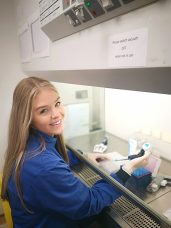Cysteinyl Leukotriene Receptor Signalling: Novel therapeutic targets to improve patient outcomes in metastatic Uveal Melanoma

Uveal melanoma (UM for short) is a rare form of ocular or eye cancer that will spread or metastasise to the liver in half of all patients. Although it is a rare disease, Ireland has one of the highest incidence rates of this cancer in the world. Once UM spreads to the liver, patients are faced with an extremely poor prognosis as there are currently no treatments that stop UM spreading from the eye to the liver. This means that as few as 8% of patients diagnosed with metastatic UM will survive beyond 2 years.
In this project, we will establish a pipeline to access precious tumour biopsies and blood samples from patients being monitored for, or diagnosed with, metastatic UM across Ireland. This will allow us to work closely with our colleagues in hospitals across Ireland to better understand and treat this disease. Studying patient samples gives us the best opportunity of discovering how exactly this cancer grows and spreads within the body. We will analyse blood samples to identify markers in the blood that will tell us how likely the cancer is to spread outside of the eye, and whether a patient may respond to treatment. Our lab has identified drugs that stop the growth of UM cells in a dish. Throughout this project, we will collect tumour biopsies from patients diagnosed with metastatic UM and treat them with these drugs to see if they have the same effect on patient tumours.
Clinical Challenge being addressed: Metastatic uveal melanoma is an extremely poor prognosis cancer and unfortunately, Ireland has one of the highest incidence rates of this cancer in the world. Identifying new therapeutic targets in this disease are critical to improving patient prognoses. Very few patients present with detectable metastases upon primary treatment, yet half of UM patients will ultimately develop metastatic disease. Through analysing differentially expressed transcripts and proteins in patient blood samples, we may be able to develop a method of detecting dissemination faster than currently used imaging techniques.
 In addition, this project will seed sustainable growth of a collaborative Uveal Melanoma Research Group in Ireland. During this research we move towards personalised treatments for UM patients, identifying which patient cohorts respond best to new drug therapies and currently available chemotherapeutics. This will impact patients in the future by identifying which patients are likely to respond best to specific treatments.
In addition, this project will seed sustainable growth of a collaborative Uveal Melanoma Research Group in Ireland. During this research we move towards personalised treatments for UM patients, identifying which patient cohorts respond best to new drug therapies and currently available chemotherapeutics. This will impact patients in the future by identifying which patients are likely to respond best to specific treatments.
Publications:
Slater K, Heeran AB, Garcia-Mulero S, Kalirai H, Sanz-Pamplona R, Rahman A, Al-Attar N, Helmi M, O’Connell F, Bosch R, Portela A, Villanueva A, Gallagher WM, Jensen LD, Piulats JM, Coupland SE, O’Sullivan J, Kennedy BN. High Cysteinyl Leukotriene Receptor 1 Expression Correlates with Poor Survival of Uveal Melanoma Patients and Cognate Antagonist Drugs Modulate the Growth, Cancer Secretome, and Metabolism of Uveal Melanoma Cells. Cancers (Basel). 2020 Oct 13;12(10):2950. doi: 10.3390/cancers12102950. PMID: 33066024; PMCID: PMC7600582. doi: 10.3390/cancers12102950
Slater K, Bosch R, Smith KF, Jahangir CA, Garcia-Mulero S, Rahman A, O’Connell F, Piulats JM, O’Neill V, Horgan N, Coupland SE, O’Sullivan J, Gallagher WM, Villanueva A, Kennedy BN. 1,4-dihydroxy quininib modulates the secretome of uveal melanoma tumour explants and a marker of oxidative phosphorylation in a metastatic xenograft model. Front Med (Lausanne). 2023 Jan 9;9:1036322. doi: 10.3389/fmed.2022.1036322. PMID: 36698840; PMCID: PMC9868667.
Mahon N, Slater K, O’Brien J, Alvarez Y, Reynolds A, Kennedy B. Discovery and Development of the Quininib Series of Ocular Drugs. J Ocul Pharmacol Ther. 2022 Jan-Feb;38(1):33-42. doi: 10.1089/jop.2021.0074. PMID: 35089801.
Back








 Contact
Contact